- Home
- Helen Humphreys
The Lost Garden: A Novel Page 3
The Lost Garden: A Novel Read online
Page 3
One’s first experience of love is either love received or love denied, and against that experience all our future desires and expectations are measured.
My mother touched me on the head. She said, “At least you have beautiful hair.” She rubbed my chest with liniment. My mother held my hand one year when I was afraid of the bull in the back field, and wouldn’t hold it the following year, even though I was still afraid. She wiped the crumbs from my lips. “Learn to cover your mouth,” she said. Once she brushed the rain from my forehead. She spanked me. She pulled my arm too hard trying to make me keep up with her. She slapped my hand away from the cakes at tea. She dressed me. She undressed me. She soaped me in the bath, rubbed my scalp fiercely when washing it, clipped my toenails impatiently with rusty scissors. The last time I saw her, when she was small and sick and dying in the hospital, she held my head in her bony, shaky hands and said, “At least you are useful.”
My school friend was called Anna. Every night for one whole month when we were fourteen she slipped out of her bed after there was “lights out” in the dormitory, and slipped into mine. It was January. I never knew if our temporary intimacy was due to the fact that it was an unusually cold winter, or if it was motivated by some other desire that I was afraid to want, but wanted anyway. Every night Anna would lift the covers of my narrow bed and snuggle in behind me. She would nuzzle under my hair and kiss the back of my neck. Her nose was as cold as a dog’s. She would lie on her right arm and drape her left around my waist. Once I held her hand, held it tight against my stomach. Once she said my name out loud, like a promise. Then, just as I had become used to the nightly ritual, it ended. Anna stayed in her own bed and left me in mine. Perhaps she had been cautioned by a teacher, or perhaps she simply tired of me. I was never brave enough to ask.
Mr. Gregory always saved me a spot next to him on the hard wooden floor of the dining room. At night, with the blackout curtains drawn tight to the windows, the room was as dark as the inside of the earth. Mr. Gregory licked my ear, mistaking it, I think, for my mouth. He rubbed my knee with a sweaty hand. He cleared his throat, seemed just about to say something of significance, but never said it. Once he did say, “Sorry,” but this might have been because he rubbed Mrs. Royce’s knee instead of mine and realized, too late, that her lumpy cartilage didn’t feel familiar under his hand. Mr. Gregory burrowed up against me only in the dark, a sticky, sweaty nocturnal creature with nervous, moist, blind desires.
No one has ever said that they love me. Well, only my mother, but it was a defensive statement in response to my accusation that she didn’t. “Of course I love you,” she had said. “I look after you, don’t I?”
It is almost time for dinner and I am afraid to go. I have never been good at dealing with people. I much prefer to work alone. This position at Mosel had seemed possible because I was to have arrived well ahead of the Land Girls and I would be much older and more experienced than they were. The combination of these factors would ensure my authority without my having to prove or test it. But all has gone badly awry because the girls have arrived here well before me and so this place rightfully belongs to them. I am the intruder. For me to march into the dining room tonight and take charge will surely engender their immediate dislike of me, and perhaps even their unwillingness to follow any instruction at all. They have had a few days of complete freedom, have formed God-knows-what kinds of alliances with the soldiers. How can I possibly get them on my side now?
I liked my job at the Royal Horticultural Society because I had such autonomy. It was just me and the parsnips locked in deathly combat in my narrow little office on the ground floor at the back of the building near to where the dustbins were kept. On summer days, with my window open, I could smell the rubbish quite strongly, often mistaking it for the odours of my parsnip specimens. But I was left alone there. I did not have to fuss with people, only parsnips.
I almost didn’t apply for this position with the Women’s Land Army. A letter had circulated through the Royal Horticultural Society from the WLA head office and had, at some point, crossed my desk. The letter asked for volunteers who had knowledge of agricultural production and horticulture to supervise the growing of food for the war effort. Postings could be anywhere in arable Britain. The letter coincided with the “Dig for Victory” campaign, where citizens were requested to transform their flower gardens into plots for growing potatoes. There were posters all around London, and I found the slogan mildly annoying as it left out many steps of the process of growing and harvesting vegetables. I also didn’t approve of the illustration that accompanied the phrase “Dig for Victory.” A booted foot pushing a spade blade into the earth. The whole approach seemed much more to do with the war than gardening. But then everything connected with the war had become necessarily tainted by it. Everything connected with the war had become the war itself.
Every step I take across the quadrangle, every step that takes me closer to the dining hall, fills me with a heavy despair. I never wanted to be in charge of a group of girls. I am no good at this sort of thing. I just wanted to be out of London before it was bombed beyond recognition. I wanted to escape the inevitable decline of my parsnip specimens.
I can hear the girls giggling as I climb the wide stone steps up into the dining hall. There is nothing to be done but to face this. I take a deep breath and push open the studded oak door to the room.
Heavy blackout curtains are pulled across the windows where I had stood earlier, looking down into the gardens. The girls are sitting at one long table in front of the fireplace. They are completely silent as I enter the room, cross the floor towards them.
There are seven of them, including Jane. They all seem as young as the big girl I met outside the garden this afternoon. Jane is the only one of them who seems older than twenty, and she is certainly no more than twenty-five. There is an empty chair beside her at the head of the table and I slide into it. No one speaks. The heavy curtains at the windows muffle any sound from outdoors. There’s the small, shifting noise of something trickling down the chimney.
Jane looks at me with what might be sympathy or pity. “Girls,” she says. “Meet Gwen Davis. From the Horticultural Society.” She draws out the last two words for my benefit. Her mockery makes me flinch.
“Hello,” I say to the table of impassive faces. “It’s good to meet you.”
The girls regard me suspiciously.
“Don’t mind them,” says Jane. “They’ve taken a vow of hostility. It’s something to do in the evenings.”
This brings a smile to several of the faces. I realize, from Jane’s position at the head of the table and from her easy manner, that she has had unofficial charge of the girls. She is the natural leader of this little group.
I want to say something to her to indicate my acknowledgement of this observation, but I can’t find the right words. To the girls at the table I say, “There seems to have been a mix-up. You were meant to arrive after I got here.”
No response from the girls. There’s the noise of someone scuffing her shoes on the piece of floor under her chair.
The sooner I can get this over with the better. “Anyway, I’m here now,” I say needlessly, but I am so overcome with nerves that I feel completely muddled and don’t know where to start. I am not very good with groups. Something I should have thought about, really, before volunteering for this job.
“I’ll brief you, shall I?” says Jane. She touches my arm lightly, to stop me from saying anything further. “In your much regretted absence,” she says, “the county rep was by. Her name is Mrs. Billings. She dropped off our uniforms, which include, I must add, a very unfortunate sort of hat. I have your allotment of clothes. I’ll give them to you after supper.” As if on cue, the dining-hall doors open and two women enter carrying plates of food. The big girl giggles. Jane is unfazed. “Supper,” she says. “These lovely women have been hired from the village to cook our evening meal for us.” She waves a hand theatrically in their direction. “M
abel,” she says, as the elder of the women places a plate of what looks like animal swill before one of the girls. “Irene,” she says, as the other woman performs the same task. Both of the women look up and smile in a kind of alarmed embarrassment. “We’re on our own for breakfast and lunch,” Jane says to me.
“What about money?” I say.
“I’ll show you the coffers.” Jane grimaces as her plate of food is placed in front of her. “There’s money from the War Agricultural Committee.” She pokes at the lump of grey gristle floating in watery gravy on her plate. “There’s also money from the people who own this estate, to pay for the upkeep of the animals.”
“Animals? What animals?” There was no mention to me of there being any animals to look after at Mosel.
“Some cows. Two horses.” Jane puts her knife and fork down without eating any of her food. “That’s what I’ve decided to do here. Tend the animals.” There is no room in her voice for disagreement. Nor would I try. It is obvious that Jane is much more of a commanding presence than I am. She knows how to lead effortlessly. These girls are not going to be swayed by my horticultural knowledge alone. If I am to have any chance with them, if I am to gain their obedience and trust, I must lead with a light hand. Perhaps the best way to lead is to not appear to be leading at all.
I wait until all the girls have their plates of supper and Mabel and Irene have left the dining hall. “I only have a few words to add,” I say. “Please, go ahead and eat while I talk.” I am desperate now to cooperate with them in whatever way is possible to make this situation more bearable. “As you know, we are here to work the garden, and to use some of the surrounding land for potatoes. We’re all here to pitch in with the hoe.” I have forgotten the exact words but I am referring to the official Land Army song, which tries to make up for our lack of weaponry by glorifying the hoe.
No one responds to my attempt at humour. All the girls stare at me fixedly, their hands holding their cutlery raised above their food in suspended animation. I look at the big girl. “What’s your name?”
“Doris.”
“Is anyone besides Doris local?” I ask.
No one responds. Finally Jane says, “They’re mostly from London.”
“All right, then,” I say. “Tomorrow after breakfast we’ll meet in the walled kitchen garden. I will outline the work detail and Doris will be in charge of it.”
“I will?” Doris looks at me in horror.
“You will. That’s all until then. Obviously, you’ve managed well enough before I arrived. I’ll leave you to your own devices this evening. But please, no leaving the grounds. No visiting the soldiers who are billeted at the house.” I load some of what I’m guessing is mutton stew onto my fork, and the girls follow my example and start eating. Soon they are talking among themselves, ignoring me completely. Only Doris pays any attention to my presence, keeps shooting me little looks of panic.
Jane has pushed away her full plate of food. She watches me eat my supper. “Interesting tactic,” she says, in a voice meant only for me to hear. “Separating the potatoes from the potatoes.”
6
After supper has been cleared and several of the girls have gone to do the washing-up, I head downstairs with Jane to collect my Land Army uniform from the cupboard by the laundry room.
She hands out items of clothing. There are many more pieces of apparel involved in being a Land Girl than I had anticipated.
“Two green jerseys. Two pairs of breeches. Two pairs of dungarees.” Jane hurls these at me in rapid succession. “The size might not be right, but there are extras in here to sort through, and someone else might swap with you. Look at this.” She waves something in front of my nose. It’s the hat, a limp fold of felt. Jane tosses it on top of the pile in my arms. “Not even fit to be a tea cosy,” she says.
I watch Jane in the cupboard, shirts and trousers swirling around her like weather. I want to ask her about the other girls, about what’s been happening here in my absence, but her energy leaves me speechless. A mackintosh flies out of the cupboard and drapes itself over one of my shoulders. There seems to be no end to these clothes. “Why are there so many things?” I say.
Jane kicks a pair of wellingtons towards me. “It’s hard to stay clean and look smart,” she says. “In such a healthy, happy job.”
I recognize this line from a Women’s Land Army recruitment poster. It’s almost as bad as the song about the hoe.
“Why are you here?” I ask.
Jane removes the rain hat she’s jammed on her head and looks straight at me. “Why do you ask?”
“You don’t seem like the others.”
“Thank God.” She throws the rain hat onto the peak of my clothing mountain and fishes a package of Gold Flakes out from a jersey pocket. “Cadged them off a soldier,” she says. She offers the package to me and I shake my head no. “You’re right.” She lights a cigarette, inhales deeply, exhales a stream of smoke at the stacks of carefully folded bed linens. “I’m not here for a big adventure. Or to ‘do my bit.’”
“Then, why are you here?”
“I grew up on a farm. My parents thought it would be a good environment for me to return to. Especially now.”
The cupboard is getting very smoky. I back out into the hallway and Jane follows me. “Why now?” I say. We lean against the hall wall, facing each other. I rest my chin on the heap of clothing in my arms.
“Because I’m in distress. That’s what the doctors call it. The ones they took me to see. Distress.” Jane leans her head against the wall. There’s a blue vein pulsing in her left temple. The fingernails on her hand lifting the cigarette to her mouth are bitten down to the bleeding point. “And it’s true, I suppose,” she says. “I have a fiancé who’s missing. Andrew. ‘Missing in action,’ they call it. Since March fifth.”
This makes me think of Virginia Woolf. Missing in action. That’s exactly what’s happened to her. She seems definitely to be a casualty of war at the moment. Like any other.
When I used to work more actively in private gardens I was always criticized for how slowly I developed a new one. I was a very slow planter. I liked to plant one kind of flower at a time, giving it a season or two to expand into whatever space it required. Living things know what they need. I have always thought this. Why crowd something from the start, when it has had no chance yet to even become itself? Gardening, which needs patience, is often the domain of the impatient. I was sometimes not kept on in those private gardens, where the desire was for instant beauty.
I could ask Jane all the questions of curiosity and concern. But I don’t. I lean against the wall and watch her smoke her cigarette. The oily canvas of the rain hat is sticking to my chin. I am suddenly very tired. This war has gone on for so long, I think, that this endless waiting is life now. There is nothing else. “Sometimes, I think that everything we always wanted comes to us in the disguise of this war. What are we waiting for? We’re waiting to recover. We’re waiting to go home. We’re waiting for someone to return to us. Solace and love. What else is there?” I realize, too late, that I’ve said this out loud.
Jane looks at me intently. “Are those our choices?” she says.
“Yes, I think so.”
“What are you waiting for, Gwen?”
I am embarrassed by having said so much to this stranger, but I am too weary to stop now. “Love,” I say. It is the truth, and I have never said it out loud. “And you?”
Jane’s voice is soft, quiet, as though the wisps of smoke she breathes out are the words gone from her body. “I’m waiting for love too,” she says. “I’m waiting for the love I had to come back to me.”
I remember the room in the west wing I’d walked into earlier, the one with the photograph of the airman by the bed. How he looked both edgy and at ease. How I had touched his face. That must be Andrew. “Love,” I say again, because now that I have admitted it, I cannot stop confessing.
7
Of all my books that I have dragged d
own to Devon from London, the grandest is The Genus Rosa. Miss Willmott’s encyclopedia of roses is in two volumes, each huge and heavy, weighted down with her botanical earnestness. I haul them from my luggage, lie on the floor, and pull one volume onto my chest, one onto my stomach. I did this in London when the German bombing became more frenzied this past winter. Actually I started the ritual of comfort a few months before that, when my mother was dying in hospital.
I lie under The Genus Rosa on the floor of this, my temporary home. I can see all the dust under the bed next to me. The room still smells strongly of fire. The books press down on me. Surely no one could weigh as much as The Genus Rosa? But this is what I imagine—someone. This is what I think about—love.
The Genus Rosa was the only gift my mother ever gave me. The only gift I truly appreciated. The size and heft of it would have suited her fondness for theatricality. As a gesture, it was superb. She gave it to me when I graduated from gardening college. The books were so heavy she couldn’t carry them into the hall, had to pull me from the reception to come and fetch them from her car. But I didn’t mind, not when I saw The Genus Rosa sitting on the back seat of the Austin. “There,” she said, flinging open the door. “Isn’t that the most fabulous present?” And it was. It was. Perhaps I have never been as happy as I was that day. I remember the sharp smell of the leather seats, my hand on the smooth side of the car as I leaned in. And there it was, The Genus Rosa, propped up against the seat back, each volume as sturdy as the wall of a small house.
I am only a few years older than the first volume of The Genus Rosa. I like thinking that when I was born, Miss Willmott was deep in the writing of it. Was there a particular rose she was working on the exact moment of my birth? The Arvensis perhaps, or the Phoenicea? Maybe even the Rosa rugosa itself. I like to think that the moment I first breathed in the air of this world was the moment Ellen Willmott wrote Rosa rugosa at the top of a blank piece of paper.

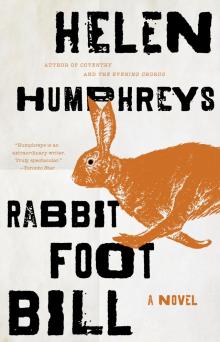 Rabbit Foot Bill
Rabbit Foot Bill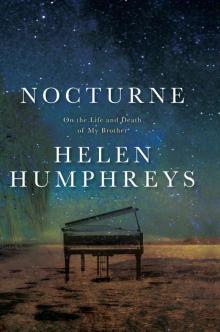 Nocturne
Nocturne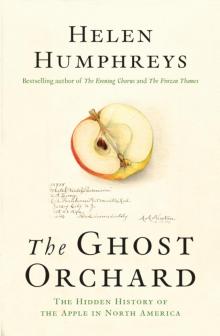 The Ghost Orchard
The Ghost Orchard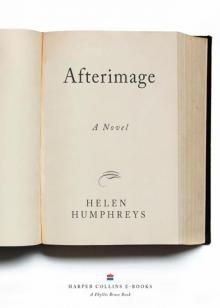 Afterimage
Afterimage The Frozen Thames
The Frozen Thames Coventry: A Novel
Coventry: A Novel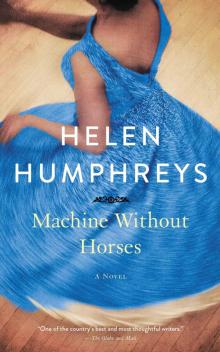 Machine Without Horses
Machine Without Horses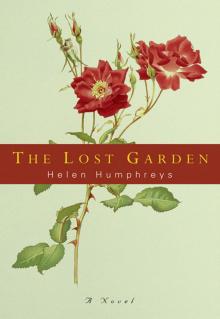 The Lost Garden: A Novel
The Lost Garden: A Novel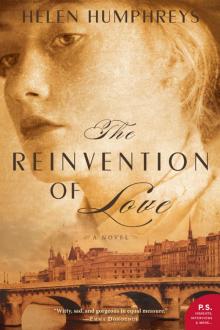 The Reinvention of Love
The Reinvention of Love Helen Humphreys Three-Book Bundle
Helen Humphreys Three-Book Bundle